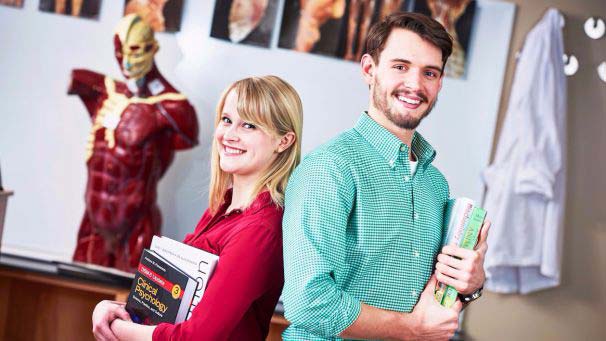Mar 23, 2015 | News
Students excel at preparing for med school

For generations Baker University has earned a reputation for preparing students for med school. Seventy-eight percent of the pre-med students who apply to med school are accepted.
A trademark of Baker’s liberal arts education, faculty working closely with talented students, is a contributing factor. The small classes allow students to learn the subjects, know their professors and explore more research opportunities.
Past professors, such as Gene Nelson, Roger Boyd, BS ’69, Cal Cink and Milford White, connected with their students. Current faculty members, including Darcy Russell, BS ’80, professor of biology and chair of the biology and chemistry department, continue the legacy and are known to help students achieve their goals and follow their passion toward a career in medicine.
Seniors Abbey Elsbernd and Brandon Haefke, both scheduled to graduate in May, are the latest in the long line of Baker students ready to embark on a science career. Both were admitted in the fall as “early decision” selections to the University of Kansas School of Medicine, which requires the students to have high scores on the MCAT as well as high grade-point averages.
“Brandon got involved in undergraduate research and has published papers on his work,” Russell notes. “Abbey took advantage of a study abroad opportunity to learn more about the medical system in the United Kingdom. Both students demonstrated a thirst for knowledge and a curiosity about the world. Of course, it doesn’t hurt that they are both brilliant.”
Abbey Elsbernd
Shortly after graduating from Andover (Kan.) Central High School near Wichita as a recipient of Baker University’s prestigious Harter Scholarship, Abbey Elsbernd arrived on the Baldwin City campus with plans to go on to medical school after completing four years of undergraduate work. Because of her father’s career as a pharmacist, she always was fascinated by science. Baker faculty encouraged her endeavors.
“Coming here and learning more on the molecular level has really encouraged my understanding and passion toward the subject,” says Elsbernd, a biology major on the molecular bioscience track and a chemistry minor. “I’ve always been interested in medical school, but my experiences in high school shadowing at the hospital where my father works really cemented that passion. The doctors I’ve met throughout my studies through shadowing experiences and volunteer work have all been wonderful, encouraging people. They are some of the people who have inspired me the most.”
Elsbernd made the most of the learning opportunities in small classes.
“The Baker experience is incredibly unique and personal,” she says. “Here at Baker, we have the benefit of small class sizes and personal relationships with other students and faculty. I feel very involved and connected to this campus in a way that I don’t know I would have experienced at any other university.
“Baker’s classes are small and allow a lot of room for discussion and classroom engagement, which I feel better taught me how to effectively learn. I feel I learned so much, not just in actual information but in study skills and time management.”
At the beginning of her sophomore year, Baker unveiled the $11.3 million Ivan L. Boyd Center for Collaborative Science Education, a renovation of Mulvane Hall, the university’s longtime science and math facility, and the addition of the Ross and Christine Hartley Hall. The upgraded structure enhanced Elsbernd’s experience in the classroom.
“I remember the old building, and it needed some serious updating,” she recalls. “The new building has so much nice new equipment and space. I feel so much more at home in this building and I’ve appreciated having new places to do labs, learn and study.”
The Baker faculty made Elsbernd feel at home. They were there to provide a better understanding of the coursework and to help her in the application process for med school.
“The professors at Baker go out of their way to help you achieve your goals,” she says. “I loved having them on my side as I went through the medical school application process. They assisted me so much, and I wouldn’t be where I am today without them. They gave me some of the best advice to tackling the big challenges before medical school, such as the MCAT and interview process.”
When she wasn’t absorbed in her rigorous studies or preparing for the MCAT, Elsbernd found time to be involved in Greek life, on-campus organizations and volunteer work.
“The biggest key to managing the many responsibilities is to find a balance between everything and plan,” she explains. “By scheduling and looking forward to the next big thing, you can really map out each day and make the most of every second.”
Elsbernd won’t forget the email notification she received from KU Med in September. She knew then the long hours of preparing for that special moment were well worth it.
“My reaction was overwhelming shock and relief, as though a huge weight was lifted off my chest,” she says. “I could barely focus all day, I was so excited.”
Elsbernd is considering many types of medicine, ranging from internal medicine to neurology. She believes medical rotations will expose her to branches of medicine she has yet to consider.
“I hope to complete medical school and residency, and then work in a hospital setting in the future,” she says. “However, after medical school I’ll have a lot of different options to consider.”
Brandon Haefke
Brandon Haefke has loved science, particularly environmental science, since childhood. Haefke became connected to Baker through Ruth Sarna, his grandmother’s sister and the longtime campus nurse before retiring last year.
“I decided mid-high school that I wanted to become a doctor, and I haven’t found any reason to change my mind since then,” said Haefke, a graduate of Holton (Kan.) High School north of Topeka.
Like Elsbernd, Haefke majored in biology with an emphasis in molecular bioscience and minored in chemistry. Before his junior year, Haefke learned more about the environment, participating in a 10-week, canopy-research project funded by the National Science Foundation. He and seven other students gathered data from different tree species on their morning climbs on a rope at locations, including the Baker Wetlands and trees outside the Boyd Center before analyzing samples in the labs to learn more about the presence and distribution of tardigrades. The project concluded with a trip to Raleigh, N.C., where Haefke and the other students joined coordinator of student research in biology Randy Miller to give a report on their findings at the North Carolina Museum of Natural Sciences.
“I feel my experience at Baker has fully equipped me to take on the adventure of medical school,” he says. “The factual knowledge I’ve learned is obviously important, but it’s also been a place where I’ve experienced a lot of emotional and spiritual growth, which is equally vital for success.”
Haefke teamed with Miller to publish the description of a new species of tardigrade, a result of a discovery made in the canopy of a walnut tree at the Baker Wetlands.
“My professors took a real personal interest in me, and provided me with all the resources necessary to develop a great understanding of the world of biology,” he says.
Having classes and labs shuffled around in the spring semester of his freshman year because of the renovation at Mulvane Hall was worth it.
“The new Mulvane is scarcely recognizable from the old one,” Haefke said. “Our new facilities make the building a real advantage for learning, rather than providing any sort of hindrance from being outdated.”
After med school, Haefke’s career goals include practicing as a primary care physician to focus on holistic care and preventive medicine. He plans to work in a hospital to gain experience with large-scale medicine and work in a smaller clinic setting.
Haefke is still adjusting to the idea of being one step closer to realizing his dream of a career in medicine.
“I don’t think the concept that I’m really going to medical school has truly hit me yet,” he said. “Perhaps, it won’t sink in until I’m actually there.”
